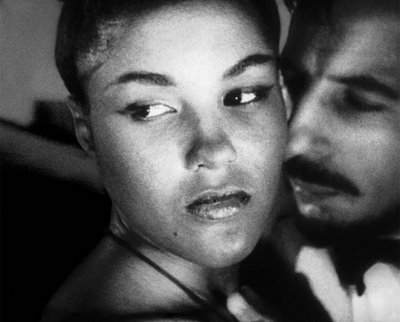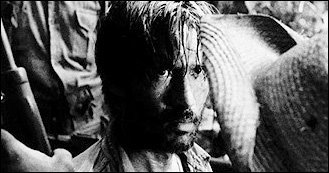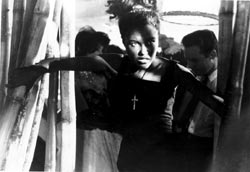
I have waited overlong to watch I Am Cuba (1964), the Soviet-produced film directed by Mikheil Kalatozishvili and written by Enrique Pineda Barnet and the poet Yevgeni Yevtushenko. To be honest, I do not like to think much about Cuba. My mother was born there in 1926, and left when a teenager, returning only once, with my toddler older sister, two years before I was born and Castro began his revolution--my grandfather's as well, who railed against Batista and Yankee imperialism most of his adult life--then renewed his zeal against Castro, whom my grandfather considered a sellout for turning to the USSR. But, as the family story goes, he had been such a friend of the revolution (at one point condemned to death, and saved only by the intercession of his Senator brother; ah, what a tale of contrasts, my grandfather born into wealth and influence--according to my mother, his family owned much of Havana, including its opera house and race track--but rejecting it all in his fervor) that he was left alone. Which leads to the second reason his crimes--kidnapping Batista's political workers until after the elections--were pardoned by Batista and his anti-Castro streetcorner harangues indulged by the communists: He was, it seemed, a bit mad, his excesses forgiven, but his position never as lofty as he would like. The tales I could--should, I guess--tell.
 But, as I mentioned earlier, I resist Cuba. Parting caused my mother such grief and in turn drew her away from us. The revolution itself--which my grandfather warned her of during her last visit, and which at the time (1954) she dismissed as more mad vigor--turned her into an exile. And it is possible her pain in part stemmed from her father's role in determining that separation--and not with the revolution alone, but earlier, in her childhood, when his sense of mission left her and her family abandoned in poverty; her decision to come to the USA has become a simple story: Some aunt or uncle told her that she had two choices: to become a nun or a prostitute, but she figured she could manage a third choice: to be herself. And then the Bay of Pigs and the Cuban Missile Crisis tore her to pieces, filled her with an anxiety I think she never fully recovered from, let alone fully released, instead adding it as anger to her longing and loss, so that she was never really at home with us, with her Sicilian husband and her New Jersey suburbanhood. Cuba for me has always seemed a kind of vague threat, something that would draw my mother from me to a dark place--despite all the stories she told, despite the black beans with rice (and we never got tired of being told mixing them together as a pilaf gave one Moros y Cristianos, a comestible version of togetherness) and plantanos maduros we would eat, despite our celebration of Little Christmas on January 6, having chosen the King of three to ask for one last present, despite her love of music and dancing, the spontaneous gyrations when she heard the right beat--despite everything she could conjure to allow us to love Cuba, for me it too often meant tears and recriminations.
But, as I mentioned earlier, I resist Cuba. Parting caused my mother such grief and in turn drew her away from us. The revolution itself--which my grandfather warned her of during her last visit, and which at the time (1954) she dismissed as more mad vigor--turned her into an exile. And it is possible her pain in part stemmed from her father's role in determining that separation--and not with the revolution alone, but earlier, in her childhood, when his sense of mission left her and her family abandoned in poverty; her decision to come to the USA has become a simple story: Some aunt or uncle told her that she had two choices: to become a nun or a prostitute, but she figured she could manage a third choice: to be herself. And then the Bay of Pigs and the Cuban Missile Crisis tore her to pieces, filled her with an anxiety I think she never fully recovered from, let alone fully released, instead adding it as anger to her longing and loss, so that she was never really at home with us, with her Sicilian husband and her New Jersey suburbanhood. Cuba for me has always seemed a kind of vague threat, something that would draw my mother from me to a dark place--despite all the stories she told, despite the black beans with rice (and we never got tired of being told mixing them together as a pilaf gave one Moros y Cristianos, a comestible version of togetherness) and plantanos maduros we would eat, despite our celebration of Little Christmas on January 6, having chosen the King of three to ask for one last present, despite her love of music and dancing, the spontaneous gyrations when she heard the right beat--despite everything she could conjure to allow us to love Cuba, for me it too often meant tears and recriminations.Oh, I do embrace my Cuban roots: I love to tell my mother's stories, I still promise to one day learn Spanish (a language her in-laws insisted my sister and I should not learn--and this was not (merely) prejudice, since Italian was discouraged as well; Italians are famous assimilators), and I am proud to carry a little piece of Cuba with me, if only to serve at the dinner table. But it too often seems to stare at me, a stranger--or something trying to make my mother one to us, with its own secret dreams, from which I am excluded. I sometimes think I am no more Cuba than Ricky Ricardo, or--worse yet--a wannabe, claiming territory I've never set foot on, let alone truly seen.
 I Am Cuba talks to me about all this, and at times wants me to see Cuba, even to own it a bit, in the film's beauty and rhythm, its dreamlike cinematography--and that may be the lever and fulcrum to pry open Cuba: It is a dream for me--maybe only my mother's dream, but told to me so often when I was a kid that I felt, not that it was my dream, but that I could enter it somehow, walk around in it, see the part of me that is Cuba. But watching it, I was again not there; I kept thinking how my mother did not live to see this movie, and how it would have made her smile and cry--and how the tears would outweigh the smile, and drive her down again--and me as well, until Cuba once more is as dark as the film sometimes grows, a shadowland where someone else's suffering becomes an anxious muttering in my head, a tightening in my chest, a fear that I am not Cuba--or that I could be, but only if I manage to carry a lifetime of someone else's loss.
I Am Cuba talks to me about all this, and at times wants me to see Cuba, even to own it a bit, in the film's beauty and rhythm, its dreamlike cinematography--and that may be the lever and fulcrum to pry open Cuba: It is a dream for me--maybe only my mother's dream, but told to me so often when I was a kid that I felt, not that it was my dream, but that I could enter it somehow, walk around in it, see the part of me that is Cuba. But watching it, I was again not there; I kept thinking how my mother did not live to see this movie, and how it would have made her smile and cry--and how the tears would outweigh the smile, and drive her down again--and me as well, until Cuba once more is as dark as the film sometimes grows, a shadowland where someone else's suffering becomes an anxious muttering in my head, a tightening in my chest, a fear that I am not Cuba--or that I could be, but only if I manage to carry a lifetime of someone else's loss. I've titled this post after a Ray Bradbury story, in which a Mexican illegal is being deported, and bursts into the apartment of his Anglo friends and chokes out that sentence. I read it as a kid, and was upset by it, and knew why.
No comments:
Post a Comment